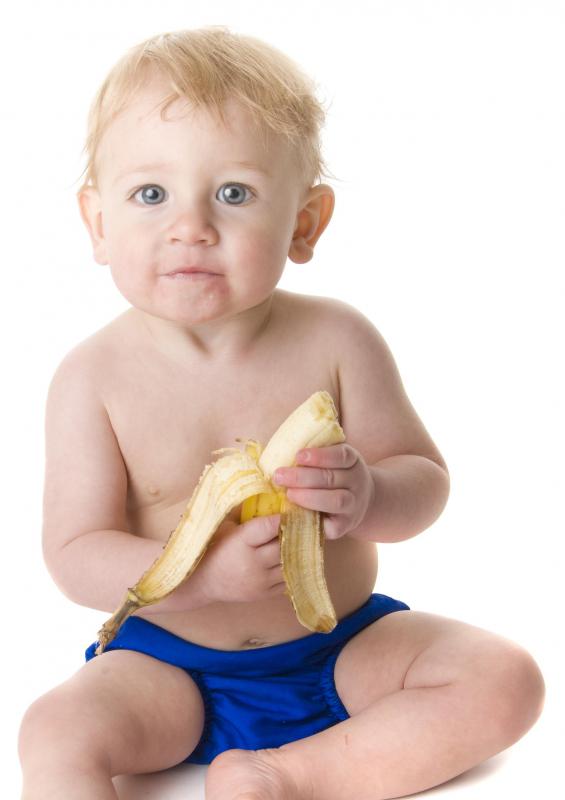At DelightedCooking, we're committed to delivering accurate, trustworthy information. Our expert-authored content is rigorously fact-checked and sourced from credible authorities. Discover how we uphold the highest standards in providing you with reliable knowledge.
What Are the Pros and Cons of Banana Baby Food?
Banana baby food is often one of the first solid foods that a parent will choose to feed her child. Like other first solid foods, bananas can usually be introduced when an infant is around four to eight months old. This type of baby food can easily be found in stores or made at home, and it contains several vital nutrients that growing infants need. Although they are very healthy, bananas can also cause constipation in some infants, so these should be eaten in moderation.
Introducing solid foods to a baby can be an exciting and frustrating time for many parents, as well as their children. Generally, most babies are ready to try solid foods when they are between the ages of four to six months, but some may not be ready until they are eight months old. When an infant is able to hold his head up and sit up by himself, he is usually ready to begin eating some simple solid foods, such as rice cereal and banana baby food.

Pureed bananas are often considered ideal for one of a baby's first solid foods. This type of fruit is gentle on a baby's stomach and simple to digest. Ripe bananas also contain simple sugars, which make them sweeter and more pleasant tasting than some other baby foods.
Since banana baby food is so common, it is often easily found in most grocery stores. It is also very simple to make at home. To make this type of baby food, a ripe banana should be peeled and cut into chunks. It should then be pureed in a blender or food processor. Unlike some other fruits, bananas usually do not need to be cooked when making homemade banana baby food.
Ripe bananas contain several important nutrients. They are rich in vitamin B6 and vitamin C, for instance. They are also an excellent source of fiber, which is necessary for regular bowel movements.

One of the biggest disadvantages of banana baby food is that it can cause uncomfortable constipation. This generally occurs when unripe bananas, which have more starch than ripe bananas, are used to make banana baby food. It can also occur, however, when a baby eats too much pureed or cut up banana.
To prevent constipation in babies, parents should make sure children also consume enough liquids. This can include water, baby formula, and breast milk. Fruit juice, such as apple juice, can also help prevent constipation in infants.
AS FEATURED ON:
AS FEATURED ON:














Discussion Comments
I'm sharing what my baby likes:
1 pureed medium size banana
milk (or formula milk when he was younger)
juice from 1 - 2 carrots,
juice from 1 small apple
rice or mixed cereal
Usually 1 tablespoon of cereal goes with 30-50 ml milk or juice. If you want it lighter, use just juice. If the baby is constipated, use yogurt instead of milk. Should you want to feed it with a spoon, use less liquids and more cereal. Baby will love it.
@sunshined-- It's too bad we don't stick with the simple sugars like a banana to satisfy our sweet tooth as we get older.
With my kids I found that I didn't have any problems with them getting constipated as long as I used bananas that were really ripe. If they were too ripe for my taste, they were perfect for the babies.
I never realized that feeding your baby too much banana baby food could cause constipation. This happened to my daughter, and so I learned my lesson the hard way.
As soon as she started eating solid food, she loved the taste of bananas. I gave her too much too fast, and she ended up getting constipated. After that, I really had to make sure I only gave her a little bit at a time until she got a little bit older.
I think babies love banana baby food because of the sweetness. This is a natural sweetness that is good for them, but it sure doesn't take long to develop a taste for sweetness!
When my son first started to eat baby food, he loved all the different kinds of fruit. I think banana and strawberry were his favorite. I find it so interesting that even as an infant, he immediately knew what he liked and didn't like.
Now he is an adult and one of his favorite snacks is a bowl of strawberries and bananas. When I introduced him to meat as a baby food, he never liked it. Today, he is not a vegetarian, but meat has never been something he has eaten much of.
I also love the taste of fruit, and was one of those parents who didn't mind the taste of baby food. I didn't usually take the time to make my own, but I think I always had more jars of banana baby food than any other kind.
Rice cereal and banana baby food were the first two solid foods I gave my daughter. She seemed to like the banana baby food better than the cereal, and I assumed it was because it was sweeter.
I always made my own banana baby food by taking pieces of a banana and mashing them up with a fork. This only took a few seconds to do and was healthier and cheaper than buying a jar of banana baby food at the store.
When she was really young, I never gave her a full banana and would eat the rest of it myself. This is probably one of the easiest baby foods there is to make yourself.
Post your comments